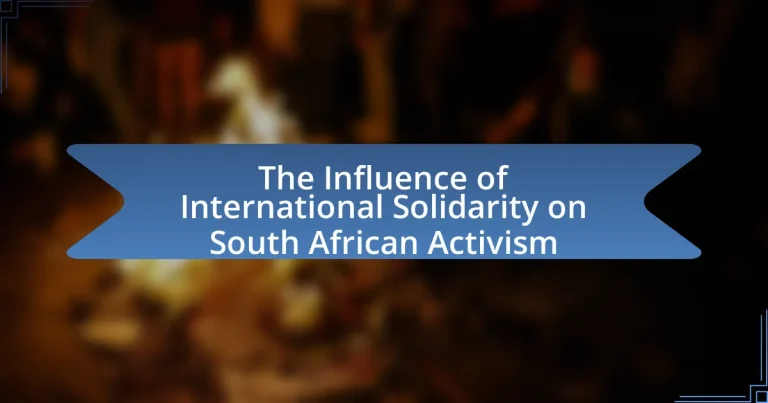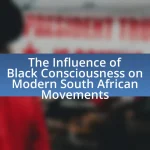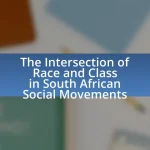The article examines the significant influence of international solidarity on South African activism, particularly during the anti-apartheid movement and its ongoing impact today. It highlights how global support, resources, and awareness have historically bolstered local efforts, exemplified by key events such as the global boycott of South African goods and the imposition of economic sanctions. The article also discusses the challenges faced by South African activists in seeking international solidarity, the role of international NGOs, and the importance of leveraging digital platforms for effective communication and collaboration. Additionally, it explores the future prospects for international solidarity in addressing contemporary social justice issues in South Africa.
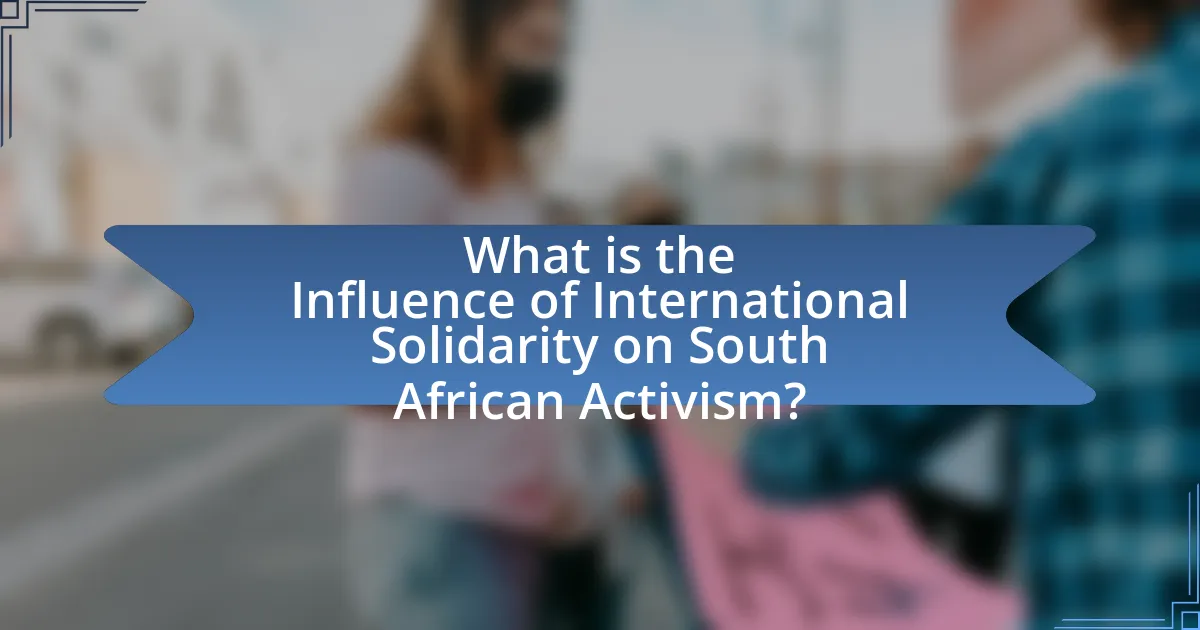
What is the Influence of International Solidarity on South African Activism?
International solidarity significantly enhances South African activism by providing crucial support, resources, and global awareness. This influence is evident in historical contexts, such as the anti-apartheid movement, where international campaigns, like the boycott of South African goods and the divestment from companies operating in South Africa, mobilized global public opinion against apartheid. Organizations such as the African National Congress (ANC) received financial and logistical support from international allies, which bolstered their efforts domestically. Furthermore, events like the 1989 international day of action against apartheid showcased the power of global solidarity, uniting activists worldwide in a common cause. This collective action not only pressured the South African government but also fostered a sense of unity among activists, reinforcing their resolve and strategies.
How has international solidarity historically impacted South African activism?
International solidarity has significantly impacted South African activism by providing crucial support and resources that bolstered the anti-apartheid movement. During the apartheid era, global campaigns, such as the boycott of South African goods and the divestment movement, mobilized international public opinion against the oppressive regime, leading to economic pressure on the South African government. For instance, the United Nations imposed an arms embargo in 1977, which limited the apartheid government’s military capabilities. Additionally, organizations like the African National Congress received funding and training from international allies, enhancing their capacity to organize protests and resistance efforts. This global support was instrumental in raising awareness and fostering a sense of unity among South Africans and their allies worldwide, ultimately contributing to the dismantling of apartheid in the early 1990s.
What key events exemplify the role of international solidarity in South African activism?
Key events that exemplify the role of international solidarity in South African activism include the global anti-apartheid movement, which mobilized widespread protests and boycotts against the apartheid regime. Notably, the 1980s saw significant international campaigns, such as the United Nations’ imposition of economic sanctions against South Africa and the divestment movement led by universities and organizations worldwide. These actions were pivotal in isolating the apartheid government and applying pressure for change, ultimately contributing to the dismantling of apartheid in the early 1990s. The 1990 release of Nelson Mandela, supported by international advocacy, marked a significant turning point, showcasing how global solidarity efforts directly influenced South African political transformation.
How did global movements contribute to the anti-apartheid struggle?
Global movements significantly contributed to the anti-apartheid struggle by mobilizing international pressure against the South African government and raising awareness of the injustices faced by Black South Africans. Organizations such as the Anti-Apartheid Movement in the UK and the African National Congress’s international allies organized protests, boycotts, and divestment campaigns that isolated South Africa economically and politically. For instance, the global boycott of South African goods and the withdrawal of investments from companies operating in South Africa were pivotal in undermining the apartheid regime’s economic stability. Additionally, the United Nations imposed sanctions on South Africa in the 1980s, further isolating the country and demonstrating global condemnation of apartheid policies. These collective actions from various global movements created a powerful narrative that highlighted the moral imperative to end apartheid, ultimately contributing to its dismantling in the early 1990s.
Why is international solidarity important for South African activists?
International solidarity is crucial for South African activists because it amplifies their voices and strengthens their movements against systemic injustices. By connecting with global allies, South African activists gain access to resources, knowledge, and networks that enhance their capacity to challenge local and international issues, such as apartheid and economic inequality. Historical examples, such as the global anti-apartheid movement, demonstrate that international support can lead to significant political change, as seen when countries imposed sanctions on South Africa, contributing to the end of apartheid. This collaborative approach fosters a sense of shared struggle and mutual support, essential for sustaining long-term activism.
What resources and support do international allies provide to South African activists?
International allies provide financial support, training, and advocacy resources to South African activists. Organizations such as Amnesty International and Human Rights Watch offer funding for grassroots initiatives, enabling activists to conduct campaigns and mobilize communities. Additionally, international allies facilitate training programs that enhance skills in areas like leadership, strategic planning, and digital security, which are crucial for effective activism. Furthermore, these allies engage in global advocacy efforts, raising awareness about human rights issues in South Africa and pressuring local governments to uphold democratic values. This multifaceted support strengthens the capacity of South African activists to effect change and address systemic injustices.
How does international solidarity enhance the visibility of local issues?
International solidarity enhances the visibility of local issues by amplifying the voices of marginalized communities through global networks and platforms. When international allies engage with local struggles, they draw attention to these issues in a broader context, often leading to increased media coverage and public awareness. For instance, during the anti-apartheid movement, global campaigns and solidarity actions highlighted the injustices faced in South Africa, resulting in international pressure that contributed to the eventual dismantling of apartheid. This historical example illustrates how solidarity movements can effectively elevate local concerns to an international audience, fostering greater recognition and support for those issues.
What challenges do South African activists face in seeking international solidarity?
South African activists face significant challenges in seeking international solidarity, primarily due to geopolitical dynamics, funding limitations, and differing priorities among global allies. Geopolitical dynamics often result in a lack of consistent support, as international attention can shift based on global events, leaving South African issues underrepresented. Funding limitations hinder activists’ ability to mobilize resources effectively, as many international donors prioritize projects in regions perceived as more urgent or impactful. Additionally, differing priorities among global allies can lead to fragmented support, where international partners may focus on their own agendas rather than the specific needs of South African activists. These factors collectively impede the ability of South African activists to garner sustained international solidarity.
How do political dynamics affect international support for South African activism?
Political dynamics significantly influence international support for South African activism by shaping perceptions and priorities among global stakeholders. For instance, during the anti-apartheid movement, international condemnation of the apartheid regime led to widespread support for South African activists, evidenced by sanctions and divestment campaigns initiated by various countries and organizations. Additionally, contemporary political alignments, such as South Africa’s role in BRICS and its foreign policy stance, affect how international actors engage with local activism, often prioritizing economic interests over human rights concerns. This interplay of political relationships and activism illustrates how shifts in global political landscapes can either bolster or hinder international solidarity with South African movements.
What are the potential drawbacks of relying on international solidarity?
Relying on international solidarity can lead to dependency, undermining local agency and self-determination. This dependency may result in a lack of sustainable solutions, as local movements might prioritize external support over developing their own strategies. Additionally, international solidarity can sometimes misinterpret local contexts, leading to actions that do not align with the actual needs of the community. For instance, during the anti-apartheid movement, some international campaigns failed to consider the complexities of South African society, which could have diluted the effectiveness of local activism. Furthermore, reliance on external funding can create vulnerabilities, as shifts in international priorities may lead to reduced support, jeopardizing ongoing initiatives.
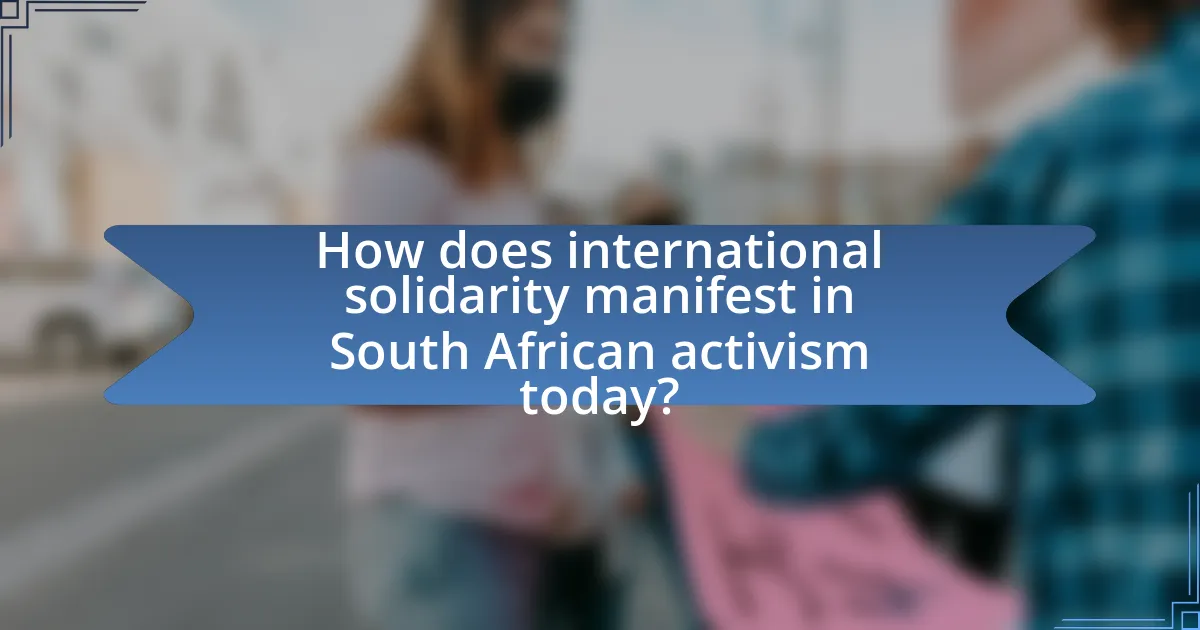
How does international solidarity manifest in South African activism today?
International solidarity in South African activism today manifests through collaborative efforts with global movements, advocacy for human rights, and support for social justice initiatives. Activists in South Africa engage with international organizations, such as Amnesty International and Human Rights Watch, to amplify their causes and draw attention to local issues like gender-based violence and economic inequality. For instance, the #FeesMustFall movement, which protested against rising university fees, gained international support, highlighting the interconnectedness of educational struggles worldwide. This solidarity is further evidenced by the participation of South African activists in global forums, where they share experiences and strategies, fostering a sense of unity and shared purpose across borders.
What forms of international solidarity are currently evident in South African activism?
Current forms of international solidarity evident in South African activism include global campaigns against gender-based violence, climate justice initiatives, and support for labor rights. Activists in South Africa collaborate with international organizations like Amnesty International and Greenpeace to address these issues, highlighting the interconnectedness of social justice movements worldwide. For instance, the #TotalShutDown movement against gender-based violence has garnered international attention and support, demonstrating solidarity across borders. Additionally, South African labor unions engage with global labor organizations to advocate for workers’ rights, emphasizing the importance of international alliances in achieving local goals.
How do social media and technology facilitate international solidarity?
Social media and technology facilitate international solidarity by enabling real-time communication and information sharing across borders. Platforms like Twitter and Facebook allow activists to connect, mobilize support, and raise awareness about global issues, such as human rights violations or environmental crises. For instance, during the #BlackLivesMatter movement, social media played a crucial role in uniting activists worldwide, leading to coordinated protests and campaigns that transcended national boundaries. Additionally, technology provides tools for crowdfunding and organizing events, which further strengthens collective action. The ability to share stories and experiences instantly fosters empathy and solidarity among diverse groups, reinforcing a global community committed to social justice.
What role do international NGOs play in supporting South African activism?
International NGOs play a crucial role in supporting South African activism by providing funding, resources, and advocacy on global platforms. These organizations often mobilize financial support for local initiatives, enabling grassroots movements to amplify their voices and reach wider audiences. For instance, NGOs like Amnesty International and Human Rights Watch have historically documented human rights abuses in South Africa, bringing international attention and pressure to bear on local authorities. This external support not only enhances the capacity of South African activists but also fosters a network of solidarity that connects them with global movements for social justice.
How do South African activists engage with international communities?
South African activists engage with international communities primarily through advocacy, collaboration, and leveraging global platforms to raise awareness about local issues. They participate in international forums, such as the United Nations and various human rights organizations, to highlight human rights abuses and social injustices in South Africa. For instance, during the anti-apartheid movement, activists like Nelson Mandela and Desmond Tutu garnered global support by appealing to international audiences, which led to economic sanctions against the apartheid regime. This historical context illustrates how South African activists have effectively utilized international solidarity to influence change domestically.
What strategies do activists use to build international coalitions?
Activists build international coalitions through strategies such as leveraging social media for global outreach, forming partnerships with local organizations, and engaging in transnational advocacy networks. Social media platforms enable activists to disseminate information rapidly, mobilize support, and connect with like-minded individuals across borders, exemplified by the global response to the #BlackLivesMatter movement. Partnerships with local organizations enhance credibility and facilitate grassroots engagement, as seen in the collaboration between South African activists and international NGOs during the anti-apartheid movement. Additionally, transnational advocacy networks, such as the International Campaign to Ban Landmines, demonstrate how coordinated efforts can amplify voices and influence policy changes on a global scale. These strategies collectively enhance the effectiveness of international coalitions in addressing shared social justice issues.
How do cultural exchanges contribute to international solidarity?
Cultural exchanges contribute to international solidarity by fostering mutual understanding and respect among diverse communities. These exchanges enable individuals from different cultural backgrounds to share their traditions, values, and experiences, which helps to break down stereotypes and build empathy. For instance, programs like the United Nations Educational, Scientific and Cultural Organization (UNESCO) promote cultural dialogue, which has been shown to enhance cooperation and solidarity among nations. Research indicates that such interactions can lead to collaborative efforts in addressing global challenges, as seen in initiatives that unite artists and activists across borders to advocate for social justice and human rights.
What impact does international solidarity have on specific social movements in South Africa?
International solidarity significantly enhances the effectiveness and visibility of social movements in South Africa. For instance, during the anti-apartheid struggle, global campaigns and support from international organizations amplified local efforts, leading to increased pressure on the South African government. The involvement of international actors, such as the United Nations and various NGOs, provided resources, advocacy, and a platform for South African activists, which was crucial in mobilizing global public opinion against apartheid policies. This support not only helped to sustain local movements but also contributed to the eventual dismantling of apartheid in the early 1990s, demonstrating the tangible impact of international solidarity on social change in South Africa.
How has international support influenced the fight for land reform?
International support has significantly influenced the fight for land reform by providing resources, advocacy, and legitimacy to local movements. For instance, organizations like the International Land Coalition have facilitated knowledge sharing and funding for land reform initiatives in South Africa, enhancing the capacity of local activists. Additionally, international pressure from human rights organizations has compelled the South African government to address land inequalities, as seen in the 2018 land expropriation debates, where global attention highlighted the need for equitable land distribution. This external backing has empowered local movements, making them more effective in advocating for policy changes and raising awareness about land rights issues.
What role does international solidarity play in the LGBTQ+ rights movement in South Africa?
International solidarity plays a crucial role in the LGBTQ+ rights movement in South Africa by providing support, resources, and visibility to local activists. This solidarity manifests through global advocacy campaigns, funding from international organizations, and the sharing of strategies and experiences that empower South African LGBTQ+ groups. For instance, international pressure has led to significant legal reforms, such as the decriminalization of homosexuality in 1998, influenced by global human rights standards and activism. Additionally, partnerships with international NGOs have facilitated training and capacity-building for local organizations, enhancing their effectiveness in fighting discrimination and promoting equality.
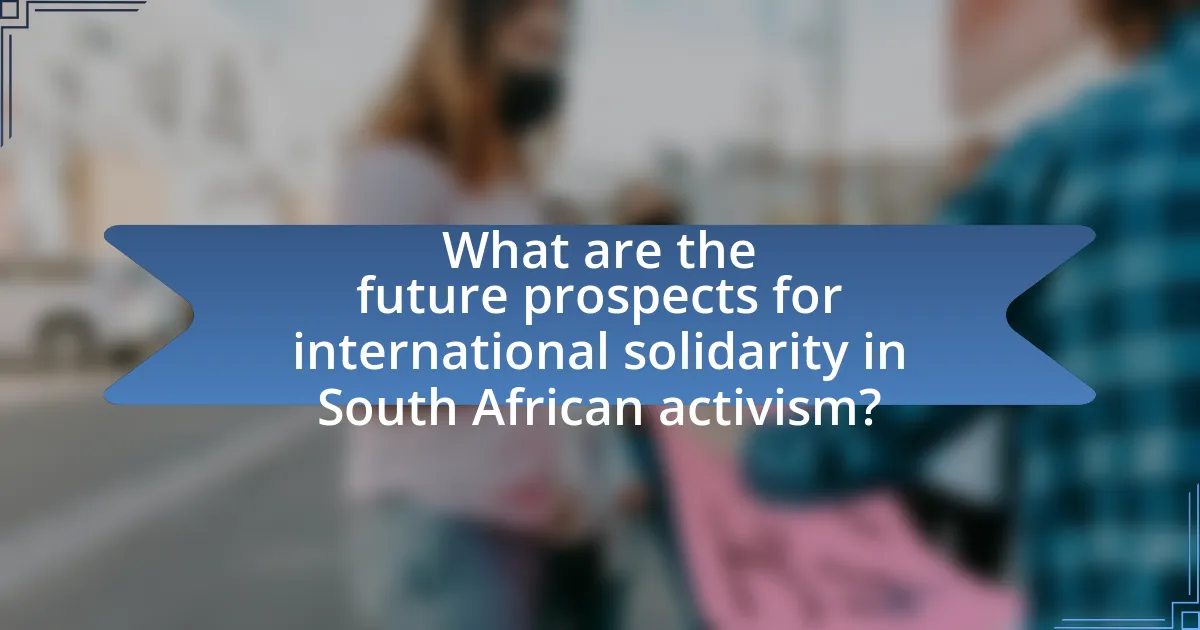
What are the future prospects for international solidarity in South African activism?
The future prospects for international solidarity in South African activism appear promising due to increasing global interconnectedness and shared social justice goals. Activists in South Africa are likely to benefit from enhanced collaboration with international movements, as evidenced by the rise of digital platforms that facilitate cross-border communication and mobilization. For instance, the global response to the Black Lives Matter movement has galvanized support for anti-racism initiatives in South Africa, demonstrating a tangible link between local and international activism. Furthermore, organizations like the African National Congress have historically leveraged international support to combat apartheid, indicating a precedent for future solidarity efforts. This ongoing trend suggests that international solidarity will continue to play a crucial role in amplifying South African activism and addressing systemic inequalities.
How can South African activists strengthen international solidarity efforts?
South African activists can strengthen international solidarity efforts by leveraging digital platforms to connect with global movements and share their narratives. By utilizing social media and online campaigns, activists can raise awareness about local issues, such as inequality and human rights abuses, thereby fostering a sense of shared struggle among international audiences. For instance, the #FeesMustFall movement effectively utilized Twitter to gain global attention, leading to international support and solidarity actions. This approach not only amplifies their message but also encourages cross-border collaborations, enhancing the impact of their activism on a global scale.
What best practices can be adopted for effective international collaboration?
Effective international collaboration can be achieved through clear communication, mutual respect, and shared goals. Establishing a common understanding of objectives ensures that all parties are aligned, which is crucial for successful partnerships. For instance, the Global Fund to Fight AIDS, Tuberculosis and Malaria emphasizes the importance of collaborative frameworks that include diverse stakeholders, leading to more effective resource allocation and program implementation. Additionally, leveraging technology for real-time communication can enhance coordination across different time zones and cultures, as demonstrated by international organizations that utilize platforms like Zoom and Slack for seamless interaction.
How can activists leverage global networks for local impact?
Activists can leverage global networks for local impact by utilizing digital platforms to connect with international allies, share resources, and amplify their messages. For instance, social media enables activists to reach a broader audience, facilitating fundraising and awareness campaigns that can directly support local initiatives. Research shows that movements like #FeesMustFall in South Africa gained momentum through global solidarity, with international organizations providing financial and logistical support, thereby enhancing local efforts. This interconnectedness allows activists to draw on global expertise and strategies, making their local campaigns more effective and impactful.
What lessons can be learned from the history of international solidarity in South Africa?
The history of international solidarity in South Africa teaches that collective global action can significantly impact local struggles for justice and equality. For instance, the anti-apartheid movement garnered widespread international support, leading to economic sanctions and cultural boycotts against the apartheid regime, which contributed to its eventual dismantling in the early 1990s. This demonstrates that coordinated efforts across borders can amplify local voices and pressure oppressive systems. Additionally, the involvement of global organizations, such as the United Nations and various NGOs, highlighted the importance of solidarity in raising awareness and mobilizing resources for marginalized communities. These historical examples underscore the effectiveness of international alliances in promoting social change and human rights.
How can past successes inform future activism strategies?
Past successes can inform future activism strategies by providing a framework for effective tactics and highlighting the importance of international solidarity. Historical examples, such as the anti-apartheid movement in South Africa, demonstrate how global support and coordinated efforts can amplify local struggles. The success of campaigns like the boycott of South African goods and the mobilization of international organizations showcased the power of collective action and solidarity. These instances reveal that leveraging global networks can enhance visibility and pressure on oppressive regimes, guiding future activists to adopt similar strategies for their causes.
What common pitfalls should activists avoid in seeking international support?
Activists should avoid the pitfall of failing to understand the cultural and political context of the international audience they seek support from. Misalignment with the values and priorities of potential allies can lead to ineffective messaging and alienation. For instance, during the anti-apartheid movement, activists who did not consider the geopolitical interests of Western nations often struggled to gain traction, as these nations prioritized their own economic and political agendas over human rights issues. Additionally, activists should refrain from over-relying on social media as their sole means of outreach, as this can limit engagement with more traditional forms of diplomacy and advocacy that are crucial for garnering substantial international support.
What practical steps can activists take to enhance international solidarity?
Activists can enhance international solidarity by forming global coalitions that unite diverse groups around common causes. These coalitions can facilitate knowledge sharing, resource mobilization, and coordinated actions across borders, which are essential for amplifying voices and increasing impact. For instance, the anti-apartheid movement in South Africa gained momentum through international alliances that pressured governments and organizations worldwide to take a stand against racial injustice. By leveraging social media platforms, activists can also raise awareness and foster connections with international supporters, as seen in campaigns like #BlackLivesMatter, which transcended national boundaries and inspired global protests against systemic racism.
How can grassroots movements effectively communicate their needs to international allies?
Grassroots movements can effectively communicate their needs to international allies by utilizing clear messaging, leveraging digital platforms, and establishing direct relationships. Clear messaging ensures that the specific needs and goals of the grassroots movement are articulated in a straightforward manner, which is essential for international allies to understand the context and urgency. Digital platforms, such as social media and dedicated websites, allow grassroots movements to reach a wider audience, share updates, and mobilize support quickly. Establishing direct relationships with international allies through networking, collaboration, and participation in global forums fosters trust and facilitates ongoing dialogue. For instance, the anti-apartheid movement in South Africa successfully communicated its needs through international campaigns, which garnered global support and led to significant political pressure on the South African government.
What role does education play in fostering international solidarity for South African activism?
Education plays a crucial role in fostering international solidarity for South African activism by raising awareness and understanding of social justice issues. Through educational programs, individuals gain insights into the historical context of apartheid and contemporary struggles, which encourages global empathy and support. For instance, universities and NGOs often organize workshops and seminars that highlight the interconnectedness of global human rights movements, thereby mobilizing international communities to advocate for South African causes. This educational outreach has been evidenced by campaigns like the global boycott of South African goods during apartheid, which was fueled by informed activism. Such initiatives demonstrate that education not only informs but also empowers individuals to act in solidarity with South African activists, reinforcing a collective commitment to social justice.
